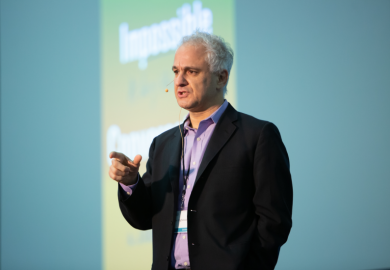Peter Singer is controversial. Many think of him as a moral hero and as an activist philosopher who has made a difference in the world. Singer is most famous for fathering the "animal liberation" movement; his book of that title sold 400,000 copies and led to great improvements in our treatment of animals.
On July 1, the Australian-born but Oxford-educated Singer assumed a prestigious bioethics chair at Princeton University. Many saw him as the best ethician in the world for the chair. But the choice triggered protest.A group of handicapped people at Princeton accused Singer of being a neo-Nazi who rejects the sanctity of human life.
Opponents quote his words: "Killing a disabled infant is not morally equivalent to killing a person. Very often it is not wrong at all." Protests are especially strong in Germany, which wants to distance itself from past Nazi killings. Many claim that Singer's views are hateful and have no right to be expressed.
We philosophers, of course, love controversy. But we prefer that it be done in a calm rational way, examining views and arguments fairly. This is exactly what is done in the book Singer and His Critics .
In this book a dozen philosophers from the United Kingdom, United States and Australia critique Singer's work; then Singer responds. The criticisms are thoughtful and well written, although complicated at times.
Unfortunately, no criticisms directly confront Singer's controversial views about killing. (The only criticisms I could find were buried in an article on famine relief.) I would have liked to have seen some intelligent frontal attacks and a response.
Singer defends himself well. He writes with clarity and directness, pointing out misinterpretations or admitting weak areas in his approach. He comes over as a top-notch thinker.
Since the discussion gets complicated, it may be helpful to highlight a few of the disputed issues using five true-or-false statements. Mark each of these as true or as false:
• 1. Other things being equal, I have an equal duty to help strangers in a far-off land as I have to help my next-door neighbours; and I have a duty to help even at significant cost to myself and my family.
• 2. If a seemingly solid moral principle leads to strange results in particular cases, we should keep our commonsense moral intuitions and reject the
principle.
• 3. It is worse to kill a human being (for example, to poison a defective infant) rather than just let it die (for example, by not performing an operation needed to save its life).
• 4. Interests (for example, pleasures and pains) of animals should be given the same basic consideration as similar interests of human beings.
• 5. Moral claims like these are objectively true or false, even though it may be difficult to reach the truth about such matters.
Your Singer index is very high if you answered TRUE to 1, FALSE to 2 and 3, TRUE to 4, and "We must distinguish ..." to 5. At least I think Singer would answer that way; apologies are in order if I misinterpreted him.
Singer's acceptance of 1 leads him to take a strong position on our duty to help poor people in other countries. If you follow him here, you will, like Singer, give a significant part of your income (perhaps 10 or 20 per cent) to help such people.
Singer rejects 2, which he thinks leads to conformist values, where we just follow what our culture taught us. He contends that moral reflection should at times lead us to change our intuitions and take unpopular stands.
Singer rejects 3 and sees killing and letting die as morally equivalent. This is important in his rejection of the inviolability of human life. Singer accepts 4 and claims that similar interests of animals and humans merit equal consideration. "Speciesists" say all humans deserve equal consideration, but greater consideration than animals. Singer sees this as indefensible - since there are no morally relevant distinguishing qualities that humans all have (even infants and the comatose), and have equally, but no animal has; so the only non-arbitrary view is equal consideration for all sentient beings.
Singer would answer 5 by making distinctions. He thinks reason can lead to definite answers on moral issues, but it matters little if we see these answers as "true" instead of as "justifiable imperatives". But he regards it as a self-evident truth that everyone's good is equally significant objectively.
R. M. Hare's contribution to the book is a real gem. Many say we ought to be vegetarians because eating meat is bad for our health, aggravates world hunger and involves cruelty to animals (especially with factory farming). As opposed to this, Hare defends the "demi-vegetarian" policy of eating little meat and selecting it carefully. This is at least as healthy as eating no meat, better for world hunger (since some hilly or arid land is suitable for grazing but not for farming) and in the interests of farm animals that are raised in a happy manner (since otherwise they would not exist). If meat is labelled as to its source, demi-veg buying habits can discourage cruel farming practices and bring much good for animals.
With some qualifications, Singer accepts Hare's defence of demi-vegetarianism, which he sees, along with vegetarianism, as being a justifiable approach.
Singer gets many of his ideas from Hare, who directed his Oxford thesis and is perhaps this century's most important moral thinker. So Singer talks about imperative inference, universalisability, imagination and consistency (which he connects with cognitive dissonance and evolutionary explanations of morality). He uses Hare's metaethics (universal prescriptivism) and basic normative framework (a two-level preference-maximising utilitarianism). Singer's originality is in applying these ideas.
This is demonstrated in his own book, Ethics into Action , which is about Henry Spira (19-98), the activist who more than anyone else got the world to respect animal rights. Spira is the Martin Luther King of the animal liberation movement. Singer wrote this book in appreciation of Spira, to further the animal liberation cause and to give activists some practical advice.
After an unhappy childhood, Spira spent many years as a socialist and union activist, and later as a civil rights activist. He got interested in animal rights through an adult education course offered by Singer. Spira saw that something was very wrong with our treatment of animals. "If you see something that's wrong, you've got to do something about it," he said.
Spira started by organising protests against cruel animal experiments at New York's American Museum of Natural History. Cats and other animals were surgically mutilated and then tested for their sexual performance; $500,000 in tax money went for this project. The museum at first ignored Spira; but protests increased, patrons threatened to cut off funds and the museum was forced to stop.
Spira turned to Revlon, which used animals to test the safety of its cosmetics. The Draize test involved putting toxic chemicals on the eyes of rabbits. Spira convinced Revlon to fund research into alternative tests not involving animals. These turned out to be more accurate and less expensive, besides being less cruel. Once the ball was rolling, Spira turned to other areas - including other animal research, face-branding on cattle and factory farming. Spira was successful in most of these, leading to better treatment of animals.
Singer's book is a "must read" for activists. It suggests that we focus on achievable projects instead of trying to do everything at once. Do not divide people into saints and sinners but put yourself in the place of the people you want to change and explore how they can achieve their goals without, for example, being cruel to animals. Be patient, and change your strategy if needed. Above all, do your homework and get the facts straight.
So is Peter Singer a moral hero or a Nazi? He is a moral hero. Nazis do not regard everyone's good as equally important or give a fifth of their income to help poor people who are mostly of other races.
But being a moral hero is perhaps compatible with having wrong ideas about the sanctity of human life. Singer, seemingly a non-believer, tells us that our religious beliefs can influence what is reasonable to believe about this issue. I suspect he may be right about this.
Harry Gensler, SJ, is professor of philosophy, John Carroll University, Cleveland, United States.
Singer and His Critics
Editor - Dale Jamieson
ISBN - 1 55786 908 1 and 909 X
Publisher - Blackwell
Price - £50.00 and £15.99
Pages - 368
Register to continue
Why register?
- Registration is free and only takes a moment
- Once registered, you can read 3 articles a month
- Sign up for our newsletter
Subscribe
Or subscribe for unlimited access to:
- Unlimited access to news, views, insights & reviews
- Digital editions
- Digital access to THE’s university and college rankings analysis
Already registered or a current subscriber? Login



